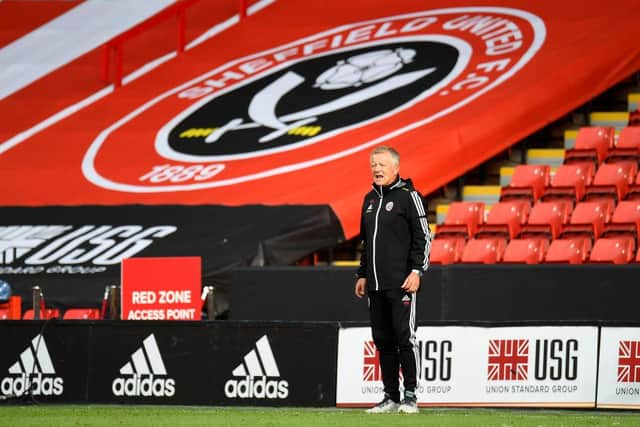The myths and the mundane reasons behind second season syndrome as Sheffield United prepare for the new Premier League campaign
and live on Freeview channel 276
“Who says we are going to struggle? People are always going on about that,” the Sheffield United manager said, barely half an hour after the final whistle of his team’s visit to Southampton. “Why is it ‘inevitable’ - as nearly everyone wants to tell me - that we’re going to do well to keep our heads above water from here on in?”
The affliction, which supposedly strikes down clubs who initially excel in the Premier League after climbing out of the Championship, has been the subject of more research and investigation than many medical conditions. It has spawned countless articles, dissertations and analytical features. But Wilder actually wonders if it even exists at all. Indeed, despite doing the journalist who asked the courtesy of providing an answer, he made his frustration with the question absolutely clear.
Advertisement
Hide AdAdvertisement
Hide AdAlthough Wilder’s irritation was understandable - at the beginning of the campaign, soon after winning promotion, the ‘experts’ were tripping over themselves to predict United were destined for relegation - he should actually have taken the query as a compliment. If his squad had survived by the skin of its teeth - not finished ninth in the table after making an unlikely challenge for Europe - no one would be bothering to pursue this line of enquiry.
Lots of theories abound about why teams like United, who defied expectations in the top-flight last term, often fail to hit the same heights next time around. Some folk believe it is because they get a little too comfortable. Others, including former Hull City, Sheffield Wednesday and now Newcastle manager Steve Bruce, insist it is a combination of different factors. A simple recalibration being chief among them.
“I don’t know how many times I’ve done interviews saying we’d done enough in games but we didn’t score the goals our play deserved,” Bruce said, reflecting on events which saw his City side relegated in 2015, two seasons after going up.
“I couldn’t have wished any more from the players. But we didn’t score enough goals. We weren’t good enough to score the goals.”
Advertisement
Hide AdAdvertisement
Hide Ad“When I looked at what we had in August, I thought we had enough,” he added, acknowledging proven strikers command the type of salaries only those established at the highest level can afford.. “But in the end, it turned out we hadn’t.”


The hypothesis Wilder definitely does not subscribe to is the one, given their pioneering tactics and take on the 3-5-2 system, most often being associated with United.
“I don’t think we’ve taken anyone by surprise at all,” he said earlier this year. “There’s too much analysis that goes on, too much video work and too much scouting, for that to happen. Really, the idea that we’ve shocked people with how we set up is complete nonsense.”
“Even before we came up out of the Championship, I’m telling you now that people like Jurgen (Klopp) at Liverpool and Pep Guardiola at Manchester City will have known everything about us. The way we approach our football and what we ask our players to do.
Advertisement
Hide AdAdvertisement
Hide Ad“We do the same here. We know everything, or as much as it’s possible to know, about everyone else.


“There’s cameras everywhere now. You can’t catch people on the hop. It’s impossible.”
One of Wilder’s most successful predecessors, Neil Warnock, agreed when asked to comment on United’s prospects next season on Thursday morning.
“Why are they definitely going to find it tougher,” Warnock, now in charge of Middlesbrough, asked during an interview with national radio station Talksport. “I genuinely don’t think they or Chis get enough credit for what they’ve done.
Advertisement
Hide AdAdvertisement
Hide Ad“They’ve got an identity and a way of playing, haven’t they. I don’t think people will have fathomed them out. They’ll know how United like to operate. But knowing and stopping it are two different things aren’t they. And they’ve not been able to stop it, after a year, yet.”


Probably the best example of ‘Second Season Syndrome’ occurred following the turn of the new millennium when Ipswich Town went down after securing a place in the old UEFA Cup the year before. The sale of goalkeeper Richard Wright to Arsenal and George Burley’s decision to overhaul the options at his disposal have both been put forward as reasons for Town’s demise. A closer inspection of events back then at Portman Road reveal the actual catalyst was probably much more mundane. Yes, Wright was a huge loss. But not as big as Marcus Stewart who, after hitting the target 19 times after Town first came up, spent long periods of the following campaign on the treatment table.
Psychology is also important. But perhaps more so in the boardroom, where owners and directors can be lulled into a false sense of security after a successful season, which prevents them from making the necessary investment. Wilder has alluded to this on several occasions - stressing, however, that he is speaking in general terms rather than making observations about United’s budget.
“You can’t sit still. You can’t think you’ve cracked it. If you do, if you really think that, then I’ve been in the game long enough to know that it will jump up and bite you where it hurts. So that’s why you’ve always got to be looking to improve and driving things forward. Because that’s what everyone else will be doing and so, if you don’t, then they’ll move past you.”
Advertisement
Hide AdAdvertisement
Hide AdBruce, like Burley, knows from bitter personal experience that some of that investment should be channeled into fitness and conditioning.
“We had a great midfielder here,” he said, referring to Scotland’s Robert Snodgrass. “Then he got injured and we could hardly use him. I remember thinking at the time ‘I hope that doesn’t cost us.’ Well, obviously, it did.”
United received a glimpse into some of the difficulties they might face when competition resumes on September 12 during ‘Project Restart’ - the window in which the PL completed its fixture programme following a three month hiatus due to the Covid-19 pandemic. Within touching distance of a Champions League berth before lockdown, United’s defeat at Southampton was their sixth in 11 outings. At the beginning of the season, they were beaten six times in 22 outings. With the 2020/21 season set to be squeezed into a tighter window than usual, if United do find the going tougher it is likely to be because the new schedule exposes a lack of depth within their ranks. Not Second Season Syndrome.
“It’s always tough at this level,” Wilder said. “It’s always difficult. Next season will be hard. Then again, so was the last one. Nothing is given to you on a plate.”
